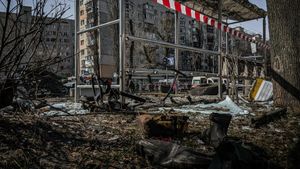Recent comments by India's External Affairs Minister Dr. S. Jaishankar have sparked significant discussion on the potential dangers of artificial intelligence (AI), drawing controversial comparisons to nuclear weapons. During his speech at the Kautilya Economic Conclave held on October 6, 2024, Jaishankar asserted, "AI will be as dangerous for the world as nuclear bombs once were." This proclamation raises questions not only about the capabilities of AI but also about how global governance might evolve to address its risks.
Jaishankar articulated the powerful impact AI will have on global structures, stating it will be one of the main factors reshaping international relations, much like nuclear capabilities once did. "Countries must prepare to deal with its after-effects," he warned, indicating the need for proactive measures to address the potential consequences of AI proliferation.
His remarks came amid growing concern globally about AI technologies and their ability to disrupt systems, whether through autonomous weaponry or deepfake technologies. With many countries rushing to advance their own AI capabilities, the race bears similarities to the nuclear arms race of the Cold War.
Jaishankar also pointed to demographic shifts, international connectivity, and advancements in AI as elements changing the world order. His observations suggest the intersection of these forces could lead to instability if not managed carefully. "Globalisation can be weaponized in the next decade," he noted, highlighting the growing skepticism surrounding global interconnectedness, often blamed for job losses and economic disruption.
Highlighting the geopolitical climate, Jaishankar criticized the United Nations for operating as merely a spectator rather than being truly effective. He equated the agency to "an old business" struggling to adapt to modern realities. His comments suggest he sees the structure of international diplomacy as needing reform to effectively address 21st-century challenges.
On the broader issue of international conflict, he remarked, "Today the fight is taking place only for economic corridors, land, and sea, but... there will be fights over climate change also". His focus on climate reflects concerns expressed by many analysts about how global warming might exacerbate resource scarcity, potentially leading to conflict.
Jaishankar emphasized the urgency for nations to understand how AI, much like nuclear arms, could redefine power dynamics on the global stage. With this comparison, he urges world leaders to establish framework guidelines ensuring responsible AI development and deployment.
The speech at the Kautilya Economic Conclave aligns with opinions expressed by various technology experts and policymakers who believe AI governance must evolve rapidly to foresee challenges associated with this technology. Experts advocate for international coalitions similar to nuclear non-proliferation treaties to manage the responsible use of AI.
Despite the risks, Jaishankar expressed optimism about the potential for AI to support progress and development if managed correctly. "It’s not about discouraging growth and innovation but ensuring these advances do not pose existential risks to humanity,” he elaborated.
The call for accountability reflects broader concerns about AI, including fears of job displacement due to automation, using AI for misinformation, and ethical ramifications around biased algorithms. Researchers and advocates argue the terms of AI development must be transparent and inclusive, drawing from diverse perspectives to mitigate its adverse effects.
With rising tensions globally, the call for increased oversight of AI technologies has become imperative among international bodies. Experts view regulation as not just about limiting applications but emphasizing ethical AI practices and transparency.
AI's potential to disrupt labor markets and influence socio-economic factors is echoed by many across sectors from fields as diverse as education to defense. The most prudent course of action, according to many analysts, is proactive policy-making based on structured ethical guidelines governing AI investments and research.
Dr. Jaishankar’s statements resonate with the sentiments of many world leaders as they grapple with the fast-emerging AI technologies and their potentially hazardous impacts. By inviting discourse on the dangers reminiscent of atomic energy developments, he emphasizes the conversation on responsible innovation is not merely theoretical. It's increasingly urgent.
While his commentary was intended to strike at the heart of the need for regulation and awareness of AI as it pertains to global power dynamics, it’s also meant to galvanize action among his peers and other political leaders to recognize the pivotal moment we are living through. \"A world without proper checks on AI is not just risky; it's potentially catastrophic,\" he cautioned, presenting a stark view of the technology's transformative potential.
Overall, as Dr. Jaishankar's statements circulate among global forums, bordering discussions deepen about the role of AI – not merely as another tool for innovation but as one with potential consequences far beyond our current imaginings. The ramifications could echo through generations, necessitating responsible stewardship to prevent destabilization akin to what nuclear technology once ushered.



